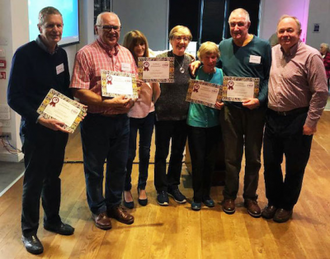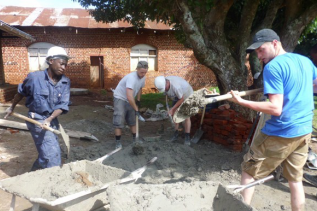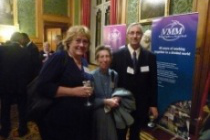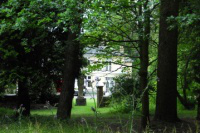VMM's 50th Anniversary - 'an amazing journey'

Edwina with awardees
"We have not saved the world, but we have deeply loved it". Edwina Gateley was speaking at this week's gathering to celebrate the 50th anniversary of the organisation she founded in 1969, the Volunteer Missionary Movement (VMM). Lancaster-born Edwina was at Liverpool Hope University, addressing around 50 members of the movement, many of whom worked overseas with VMM while in their twenties. Since 1969, the movement has provided training, support and opportunity to more than 3,000 people to volunteer their skills and service with communities in over 30 countries. VMs had travelled to the celebration from around Britain and Ireland, and from as far afield as Malta and the United States,
There were huddles over photos of VMM groups, and stories shared about how VMM blessed and changed lives. Edwina summed it up - "we can only be grateful for this amazing journey". She herself, at the age of 21, went out to Uganda to work as a teacher for three years under the auspices of the White Sisters and returned with a vocation to set up a missionary structure for lay people called to mission. Inspired by the documents of Vatican II, she brought her "dream and vision" to the hierarchy of England and Wales but could not generate any interest. However, when back in Africa, she heard that the Missionary Societies of England and Wales would provide money and the Mill Hill Missionaries offered a house for the first training courses to start.
Finally, lay people had opportunities to be more deeply involved in the mission life of the Church. Within 10 years Cardinal Basil Hume and Bishop James O'Brien attended the opening of a bigger property at London Colney, which was given by the Westminster Diocese on a peppercorn rent for 15 years. VMM flourished here and when the base moved to the Comboni Missionaries in Sunningdale. Lay mission was now fully recognised, and VMM has long been a member of the Catholic Missionary Union. Before Edwina moved on to mission in the United States, where she is still based, she wrote the VMM Spirit and Lifestyle, which expressed the charism and vision of VMM.
But what did this mean in practice? Well my husband Gerry - who had worked with VMM in Zambia for four years in the 1970s - and I. did a preparation course in November 1980 with around 25 others before moving to Northern Nigeria to work - he as an engineer and me as a teacher. There was information about the places and people with whom we would be working, medical information and briefing on our own projects. But more than that was the emphasis on the missionary element, with shared prayer and faith reflection twice a day. We were introduced to the Church's Social Teaching - learning from Populorum Progressio that we must listen and learn from other cultures as well as serve. Speakers included the Nobel Peace laureate Sean McBride and we had engagement with missionary societies. I was learning about such things as 'Basic Christian Communities' and cross-cultural mission for the first time, despite my Catholic education and parish activity.
I remember hearing the hymn, 'I will be with you wherever you go' for the first time. So, the spirituality of VMM was impressive, but also the emphasis on participatory liturgy and on community. It encouraged a deep faith development, a path of service to others and openness to learning from the poor communities where we were sent. A strong and often lasting bond between participants developed.
At this week's gathering one VM said he learnt from his two years in Tanzania that "poverty doesn't equal misery, nor wealth equal happiness". Another applauded "the simple faith and the generosity of the average Ugandan". One described "feeling so alive all the time because of the unpredictability of each new day", and another how the Batooro people of Uganda "had patience and humility wired into their DNA, teaching me to move a bit slower and be more patient". But let's not sweep aside the sickening smells of mushrooming slums, brushes with tropical diseases from mosquitoes, jiggers and bilharzia, and local people we knew who died prematurely because of lack of access to adequate healthcare. I remember a young boy, Charles, who was blind because his mother drank unpasteurised goat milk in pregnancy. While he felt his way around our home, during a stay with us to visit Kaduna's eye hospital, his mother insisted on thanking us by baking bread. We came home to little bread rabbits lined up on the table because the only mould she could find was for jelly rabbits! And we learnt that Charles would be blind for life. He would be in his late 40s now. One VM in Uganda remembered the first plastic bags being used, in preference to wrapping in banana leaves.
The VMM community in Britain reflected on the hospitality learnt in Africa. Food was shared with those who dropped in unannounced and prayer times were open to everyone. Many a VM stayed at London Colney after returning from Africa, being penniless and unsure of where they could go. Most VMs found the culture shock of returning home far greater than the culture shock of spending their first night in Sudan or Papua New Guinea. Staying in contact with each other gave mutual support. It wasn't easy to be respected as a lay missionary in UK parishes. A lay missionary who greeted in Swahili a priest who had given a sermon about his work in Tanzania found him turning and walking away without response. We never found out why.
Most VMs never truly settled back to the same life we had led before Africa and elsewhere in the global south. All of us appreciated - in a way we didn't before - fresh drinking water, food security and the importance of valuing people for who they are rather than what they do. People's resilience and faith in God no matter what their circumstances will inspire me forever. I remember the day Gerry unpacked a delivery of technical equipment for his Church media project but most local workers rejoiced in sharing out the cardboard boxes - none of the packaging was wasted. One of his workers used to regularly give us bananas - and what a shock to visit his squalid home by an open sewer, and meet his children, and be ashamed that we had accepted his generosity. When we left Nigeria, the parish hosted a party and people spoke about what they would miss about us; to our surprise it wasn't the skills we shared but our choosing to attend the Hausa Mass on Sundays rather than the English Mass which was attended by the parish dignitaries with western hymns. We weren't making a statement - we simply loved the Hausa drumming.
Many of us remain committed to social justice. At one time in the 1980s CAFOD had four VMs on the staff and SCIAF two. I run into VMs regularly at climate and refugee actions and lobbies. Just this past week VMs took part in the anti-arms fair protests in London's Docklands. I believe my first interest in ecological issues started by Northern Nigeria, hearing local people talk about the Sahara moving south, a shortening rainy season and the killing of forests and wildlife for profit. The need for "ecological conversion" was right there, some three decades before Laudato Si' and VM formation helped me recognise it. And I went on to work for eight years for CAFOD and then the Columban Missionary Society.
During this week's gathering, Edwina presented awards to VMs active in the UK over the last decade. One was to Mark Wiggan, who worked in Uganda 1978-82 and is the current Director of Caritas Salford. He acknowledged that "VMM started my faith journey". There was laughter at the number of VM weddings and the lack of money at the time, meaning that wedding receptions saw guests bringing the food and drink - and what a wonderful sharing resulted. "VMM opened up a life of adventure and richness that I could not have dreamed of" said a VM from a remote coastal town in Ireland.
We heard about VM activity in parishes today, whether serving the new partnership scheme in Hexham and Newcastle Diocese to promoting the Season of Creation in a parish in Shrewsbury Diocese. And some have run homeless charities and refugee projects. Others have been involved in the management of the lay missionary programmes of religious congregations. Yet, it must be said that VMM's commitment to ecumenism from almost the beginning has been a trailblazer.
But what of the future in the UK?
Well the need to love and heal a broken world remains and, as Edwina puts it, "the Spirit dances on in all of us". But the context of the VMM has changed. Along with other missionary orders, recruitment is harder than in the past. How do young people hear about VMM if they do not attend a church regularly? Most young people with a third level education are heavily in debt as well, and short-term mission experience seems to be more popular. The demographic for recruitment has changed with more people in early retirement making contact. Building identity, community and VM spirituality is a challenge of formation that was widely discussed at the gathering and there was a commitment to build up VMM's social media to take on board more the communications revolution and improve VM links internally and externally. Mission appeals to raise awareness and funds, and two VM shops in Liverpool, are thriving. Hope University is a solid partner, particularly offering office space for two workers and meeting rooms. Bill Chambers, the VMM Chair, is also Vice-Chancellor Emeritus of Hope University.
Edwina Gateley's unfailing commitment to reach out to vulnerable people at the peripheries and her visionary writings continue to inspire. She has been a pioneer of Christian feminism and Creation Theology and continues to assist VMM to find its path into the future. Edwina summed up best the sense of this 50th anniversary gathering: "Sharing our faith, friendship and skills, we have received much love and blessings." Her words in 'Spirit and Lifestyle' could be borne in mind during next month's Extraordinary Month of Mission:
"As lay people we give a special witness to the reality that all the People of God are called to involvement in Christ's mission. All who hear God's Word are called to respond. Bishops, builders and nurses alike must work together, equally, towards the coming of the Realm of God. Mission is given to us all."
LINK:
www.vmminternational.org/april-17th-1969-vmm-celebrates-50-years-of-volunteering-with-mission/


















